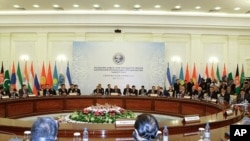The Asian regional alliance known as the Shanghai Cooperation Organization was originally set up to deal with border disputes among China, Russia and several Central Asia countries. After 10 years and billions of dollars in Chinese loans, outside analysts say the group is flourishing and attracting new members.
As the Shanghai Cooperation Organization celebrates its 10th anniversary this year, the group is considering expanding its membership for the first time beyond original members China, Russia and the four central Asia countries Kazakhstan, Kyrgyzstan, Tajikistan and Uzbekistan.
This week the top leaders from those countries will be joined by the presidents of Iran, Pakistan and Afghanistan, as well as India’s foreign secretary, for a summit in the Kazakh capital Astana.
New momentum
Richard Weitz, with the Washington-based public policy organization the Hudson Institute, says the SCO grouping has a new momentum that even its members did not expect.
“They have all been surprised by how rapidly and well it has developed in its first years. They did not anticipate that,” Weitz said.
The SCO countries all have their own interests, especially the two biggest members: China and Russia. Weitz says Moscow and Beijing share common interests in fighting extremism and instability.
He says energy is one area that many observers thought would lead to conflict, but instead has so far led to cooperation. He says he thinks this is because China, with its huge energy needs, so far has been intentionally deferential to Russia, which has energy resources to sell.
Multilateral format
Weitz says smaller member countries are also benefiting from the SCO’s multilateral format.
“For the other countries, it is a good way to find deals with both Moscow and Beijing," he said. "Trying to deal with either country one on one, they are inherently at a disadvantage because they are a lot weaker. But having them all pulled together, it allows a little more balance and is the same as has been quoted by some unnamed Central Asian official, when she said that having the Chinese in the room means the Russians can’t resort to their usual tricks.”
SCO membership also gives countries access to preferential loans from China’s Import-Export Bank. China has been a prolific lender in recent years, and by some estimates doles out more money in loans to the developing world than the World Bank.
In 2009 alone, Chinese President Hu Jintao announced $10 billion worth of loans to other SCO members.
Chinese lending officials say they have implemented more than 50 projects in SCO member states that are aimed at promoting economic and social development. The bank says loans support programs relating to communications, transportation, energy and agriculture.
Chinese Assistant Foreign Affairs Minister Cheng Guoping said nearly three quarters of that money already has been provided to recipient countries, and he indicated more could be on the way.
Financial support
Cheng says other SCO members expect stronger economic and financial support from China, so President Hu will be discussing what else can be done within the SCO framework to promote what he described as practical economic cooperation.
The SCO now has four observers: India, Iran, Mongolia and Pakistan. All but Mongolia are applying for full membership.
Turkey also has applied to join Belarus and Sri Lanka as an SCO dialogue partner.
Outside observers say they do not expect the group to take on more full members this time, but Cheng says enlargement is an inevitable process.
Cheng says leaders at the Astana summit will sign a document on legal conditions for new membership. He says the SCO charter states that new members are admitted based on a consensus of existing members.
Criticism
While member states praise the benefits of joining, human rights groups are less enthusiastic.
Rights groups say SCO members adopt China’s approach to terrorism, which also lumps separatism and extremism into the definition.
Sharon Hom, who heads the New York-based group, Human Rights in China, says the SCO is “absolutely on the same page as China” in terms of adopting Beijing’s approach to counter-terrorism.
“The actual practices of the SCO have engendered practices that violate the rights of individuals, through practices like blacklists, and the collection of intelligence through extradition and forcible return and denial of asylum, and also through joint military and law enforcement exercises, in which China is very, very prominent," said Hom. "And they often include exercises conducted in ethnic regions. And the simulated events often involve how to control civil unrest.”
In May, Chinese forces joined troops from Kyrgyzstan and Tajikistan in counterterrorism drills in China’s far northwestern Xinjiang. The restive region is home to China’s Muslim minority Uighurs, a Turkic people whom the Chinese government is accused of suppressing.
Ahead of Wednesday’s summit in Kazakhstan, China confirmed that host nation Kazakhstan has turned over a Uighur refugee who fled to the country in 2009 following ethnic riots in China’s Xinjiang region.
Chinese Foreign Ministry spokesman Hong Lei confirmed the extradition. He says the Uighur man was wanted by Chinese security authorities. He said the case is now being handled by Chinese judicial authorities.
Human Rights in China says Ershidin Israil was initially granted refugee status by the United Nations in March last year, but he was later arrested by Kazakh authorities and denied political asylum. The group says his treatment raises serious questions about the impact the Shanghai Cooperation Organization has on respect for human rights.
Analysts: Shanghai Cooperation Organization Flourishing, Thanks to Help from China




